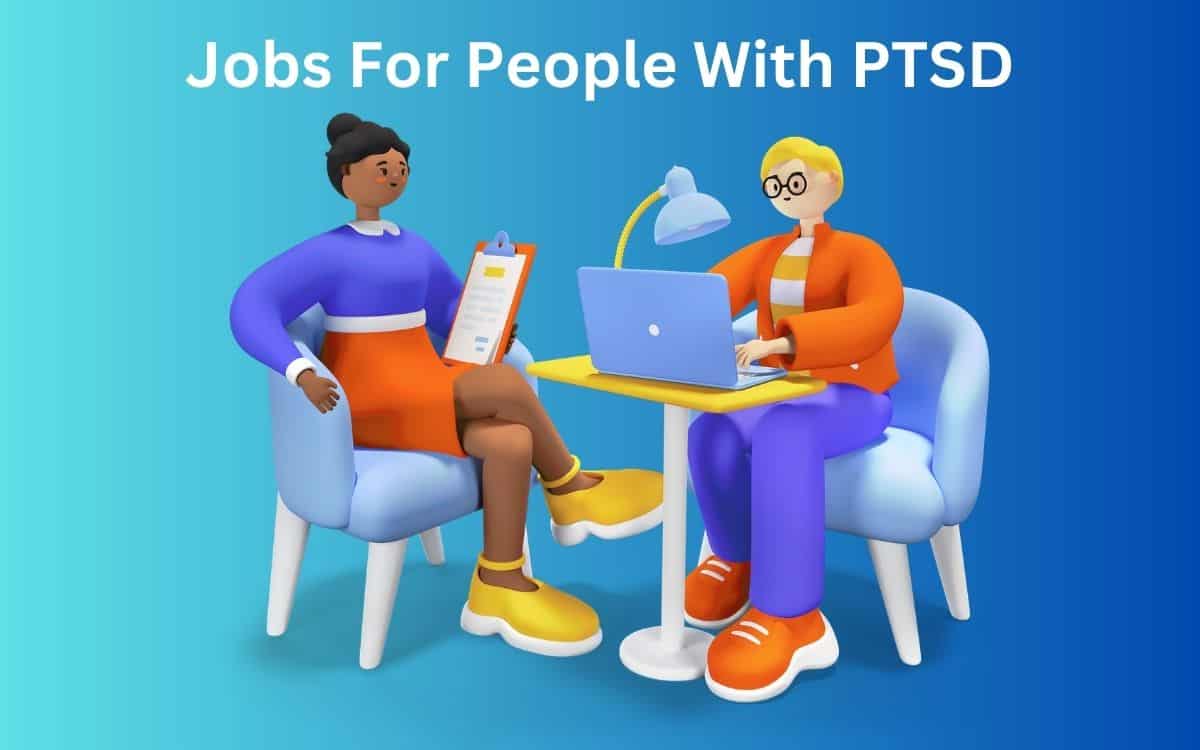
Post-traumatic stress disorder (PTSD) can make finding and keeping a job challenging. But when it comes to finding jobs for people with PTSD, many great options are available. This article explores the best jobs for PTSD sufferers. Read on to learn about jobs that provide flexibility, low stress, and a sense of purpose.
PTSD is an anxiety disorder that can occur after experiencing a traumatic event. Symptoms include flashbacks, nightmares, avoidance of reminders, hypervigilance, and difficulty sleeping. These PTSD symptoms can make working a standard 9-5 job difficult. Loud noises, crowds, or an abusive boss can trigger symptoms and worsen PTSD.
Fortunately, many jobs work well for people managing PTSD. The right job can provide meaningful work and financial stability without aggravating your symptoms. Here are some of the best jobs to consider if you live with post-traumatic stress disorder.
Key Takeaways
What Makes a Job Good for Someone With PTSD?
When looking for jobs, there are a few key factors to consider:
- Flexibility – Many people suffering from PTSD need flexible work schedules to manage flare-ups in symptoms. Jobs that allow you to set your hours or work from home can be ideal.
- Low-Stress – Work environments that are chaotic, fast-paced, or highly social can heighten anxiety. Look for jobs with minimal stress.
- Security – Symptoms like hypervigilance can make you feel unsafe. Seek jobs that provide a high degree of physical and emotional security.
- Purpose – Having a sense of purpose in your work can aid recovery from PTSD. Find meaningful jobs that help others.
- Accommodating Employers – Look for employers familiar with PTSD who will accommodate your needs.
- Options to Work Independently – Many with PTSD prefer to work alone to limit social anxiety. Seek jobs that allow you to work independently.
- Outdoor Options – Nature can be calming. Outdoor jobs like landscaping may be a good fit.
- Helping Others – Assisting people in need can boost self-esteem and mood. Careers in counseling, healthcare, or social work may be rewarding.
Best Jobs for People With PTSD
Here are some of the top jobs for people living with PTSD:
1. Librarian

Working as a librarian can be an excellent option if you’re seeking a job and suffering from PTSD. Librarians typically work indoors in a quiet, low-stress environment. While some social interaction is required, librarians often have opportunities to work independently.
Many libraries allow librarians flexibility in their schedules. You may be able to work part-time, alternate between standing and sitting, or take breaks when needed. Becoming a librarian also provides the reward of helping people access information and resources.
A study from the Bureau of Labor Statistics shows librarians’ job outlook is strong, with employment expected to grow 6% from 2021 to 2031. Most librarians need a master’s degree in library science. But some jobs are available for those with a bachelor’s degree.
2. Pet Sitter

If you enjoy working with animals, pet sitting can be one of the best jobs you could have. As a pet sitter, you would visit clients’ homes to care for pets while owners are away. This allows you to work independently and enjoy the calming presence of animals.
Pet sitters can often set their own schedules, doing as much or as little work as possible. You may also be able to arrange for clients to drop off and pick up their pets, avoiding the need to go inside their homes if preferred.
Working with dogs, cats, and other pets can be emotionally rewarding. And pet sitting provides the flexibility many people with PTSD need. No formal education is required, making this an accessible job option.
3. Temporary Office Employee

Working as a temporary office employee allows you to take on short-term assignments in a low-stress office environment. Temporary job agencies can help you find positions that match your interests and abilities.
Placements may include data entry, virtual assistant services, administrative work, bookkeeping, and secretarial work. These jobs often have set hours and provide structure, allowing you to change assignments as needed.
The ability to change workplaces frequently can help if you find certain environments trigger your PTSD symptoms. Temporary work may also lead to a permanent position with an accommodating employer.
4. Trainer

Do you have expertise in fitness, music, or arts and crafts? Put your knowledge to use as a trainer. One-on-one personal training or small group classes provide social interaction on your own terms. And you can teach classes in a space you find calming and secure.
Working as a trainer allows you to set your own schedule and manage your workload. You won’t have to commit to a stressful full-time job. Completing a certification program in your specialty can qualify you for this rewarding work.
Additional Jobs to Consider
Here are a few more good jobs for people living with PTSD:
- Landscaper or Groundskeeper
- Customer service or Data entry from home
- Nighttime Security Guard
- Physical or occupational Therapy Assistant
- Massage Therapist
- Sign language Interpreter
- Proofreader/Copyeditor
- Park Ranger
- Pest control Worker
- Baker or prep Cook
Consider your hobbies, interests, and abilities when looking for the right job. Jobs that feel meaningful rather than merely transactional can aid your recovery. Look for workplaces known for being disability-friendly. And consider roles that allow you to help others experiencing hardships.
With the right support in place, many good jobs are possible, even with the limitations of PTSD. Finding work that provides security and purpose without aggravating your symptoms is the most important thing.
Key Factors in Managing PTSD and Employment
If you’re suffering from PTSD, certain work conditions can make holding a job challenging. But you can also do many things to set yourself up for success.
Here are some key considerations:

1. Find Jobs That Work With Your Symptoms
Avoid jobs with loud noises, flashing lights, or chaotic environments that trigger symptoms. Seek calm, low-stress jobs that allow you to work independently when possible.
Outdoor jobs or office roles may be better fits than crowded retail settings.
2. Disclose Your Condition Appropriately
While disclosing your PTSD to employers is personal, it can help ensure you get the necessary accommodations. Many employers are willing to make adjustments. Being open may allow you to negotiate flex hours, work-from-home options, or a quiet workspace.
3. Take Time for Self-Care
Making self-care a priority helps prevent work from worsening your mental health. Build in daily routines like exercise, relaxation practices, and connecting with loved ones. Set boundaries around your work availability. And take time off when you need it.
4. Find Other Sources of Income if Needed
The structure of full-time work can be too much when PTSD symptoms flare up. Have a backup plan like disability benefits or a part-time job you can manage when too unwell to work full-time.
5. Consider Job Coaching or Vocational Rehab
These services can help you identify your strengths, train for jobs, craft resumes, interview successfully, request accommodations, and sustain employment. They provide expert support.
6. Join a Job Club or Support Group
Connecting with others with PTSD and employment challenges makes you feel less alone. Groups also provide tips on managing PTSD at work. Look for an in-person or online club.
Developing a Fulfilling Career Path with PTSD
Living with PTSD requires self-knowledge and planning when charting your career path. Here are some tips:
- Assess your symptoms and abilities – What work conditions trigger your PTSD? When are you at your best? What skills can you bring to a job?
- Research disability-friendly employers – Seek out companies known for inclusivity in hiring and supporting people with disabilities.
- Consider skills training or higher education – Further develop your interests and skillset through classes, certifications, apprenticeships, or degree programs.
- Connect with a career counselor – They can advise you on job options suited to your needs and goals. A counselor experienced in PTSD is ideal.
- Start your own business – Working for yourself allows you to control your workload, environment, and schedule.
- Try volunteering or interning – Explore new career paths in a low-pressure way while giving back.
- Be open with supportive loved ones – Family and friends can help with your job search, training, and stress management.
- Don’t give up – With persistence and the right support, you can find a fulfilling career path with PTSD.
FAQs
What Types of Jobs Allow You to Work From Home?
Customer service, telehealth, tutoring, writing, graphic design, and computer programming are some jobs people with PTSD often perform successfully from home. Flexible remote positions provide control over your environment.
Should You Tell Employers About Your Ptsd Diagnosis?
It depends. Disclosing may help you get accommodations but risks discrimination. Consider the culture and your needs. If your symptoms don’t affect your work, you may opt not to disclose them.
Does PTSD Qualify You for Disability Services to Help Find a Job?
Yes. PTSD can severely limit functioning, making you eligible for services like job coaches, skills training, resume help, interview prep, accommodations, and workplace support. These can aid your employment.
Are Part-Time Jobs Better for PTSD?
Often yes, especially if you experience frequent symptom flare-ups. Part-time work provides structure without being too demanding. It can supplement other income sources. But some people prefer the routine of full-time work.
What Should You Do if a Job Worsens Your PTSD?
First seek accommodations like a quieter workspace. If that doesn’t help, consider changing positions within the company. Leaving the job may ultimately be necessary for your health if problems persist. Don’t jeopardize your recovery.
Final Thoughts
Finding the right job if you have PTSD, can greatly improve your overall well-being and quality of life.
By considering factors such as flexibility, low stress, security, and purpose, you can explore job options that suit your needs and accommodate your symptoms.
Whether it’s working as a librarian, pet sitter, temporary office employee, or trainer, numerous opportunities are available that can provide a sense of fulfillment while supporting your mental health.
It’s equally important to prioritize self-care, disclose your condition appropriately, and seek support from job coaching or vocational rehab services.
With the right support and a fulfilling career path, people with PTSD can thrive and make a meaningful difference in their professional lives.






